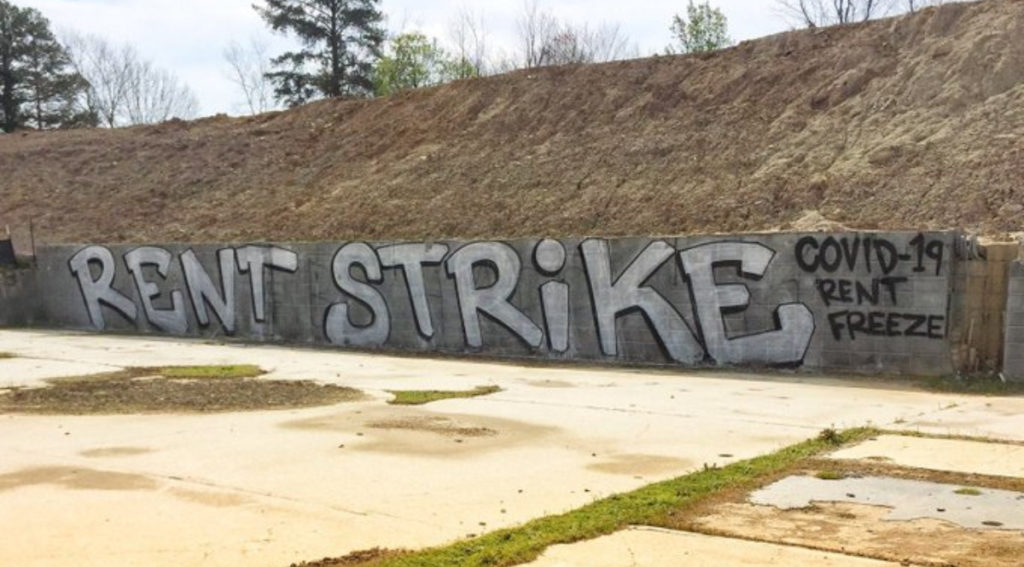As the coronavirus outbreak spreads rapidly across the United States, hitting densely populated cities like New York, New Orleans, and L.A. particularly hard, the twin public health and economic crises — and the measures the ruling class is taking to combat them — are taking their toll on working people. Now, with the end of the month coming up quickly, working people are facing yet another hurdle: how to pay rent.
With the deepening of the economic crisis and an increasing number of employers being forced to close indefinitely, a growing sector of workers is being laid off, stripped of income at the very moment an economic recession is on the horizon. Just last week, after asking local governments to hide their unemployment numbers for days, the Trump administration released a shocking report showing that 3.3 million people filed for unemployment last week.
Whether workplaces are closing as a result of state mandates or because of the pressure that the economic crisis is putting on their profits, millions of workers have been left without jobs; many of those who are still working have significantly reduced hours. They are told to stay at home and weather the crisis until conditions are better.
And of course, since the government’s priority is to bail out multi-million dollar corporations rather than ensure mass testing, provide protective equipment for workers, or produce necessary medical equipment to combat the outbreak, the best thing state governments can do is order people to stay in their homes. As an emergency measure, some state governments, such as those in New York, New Orleans, and California, have ordered people to stay in unless they are going to work or out for essential supplies.
But how can working people be forced to stay at home if they are thrown out of their homes because they can’t pay rent?
There are over 80 million renters in the U.S. Even before the crisis, most of these people struggled each month to pay rent; according to the National Low Income Housing Coalition, there is nowhere in the country where a person who works 40 hours a week and earns minimum wage can pay the rent for a two-bedroom apartment. And further, nearly 80% of all American workers live paycheck to paycheck. In New York alone, around 40% of people wouldn’t be able to make their rent payments if they lost just a single month’s worth of pay.
The current crisis has only exacerbated the precarious living situation of millions of people around the country. With the end of the month quickly approaching, many people are wondering how they can afford to stay on lockdown. And now that people are losing work and income as a result of the crisis, how will they afford rent, especially if they don’t have savings or if they can’t file for unemployment?
As the crisis escalates — as more people lose their jobs or are forced to stay at home without paid time off — it is absolutely necessary to institute a nationwide cancellation of housing payments and guarantee safe and permanent housing for all.
The Capitalists’ Non-Measures
Both state governments and the federal government have already moved quickly to protect real estate companies and landowners who are under pressure as a result of the crisis. In New York, Governor Andrew Cuomo ordered a moratorium on mortgages and evictions. On March 17, Trump ordered a limited nationwide suspension of mortgages, evictions, and foreclosures, but only for certain buildings. The suspension only applies to properties owned by the Department of Housing and Urban Development (HUD) and for lenders who have taken out loans with the Federal Housing Administration (FHA). This amounts to only about 8 million properties nationwide.
These measures lend a helping hand first and foremost to homeowners and landlords. The government has created a safety net, particularly for landlords who may default on their own mortgage payments if their tenants are not able to pay their rents in the coming months. They don’t have to worry about making their mortgage payments on time or losing their property, whether they live there or not.
The measures certainly provide some relief for a proportion of people in rural and suburban areas where it is more common to buy homes and take out a mortgage; however, these policies do not come without significant limitations that leave out huge swaths of the population who may not be able to make housing payments this month whether they own or rent their homes.
For instance, most statewide suspensions of evictions and mortgages only apply to individuals who can prove “financial hardship” as a result of the coronavirus crisis. As Cuomo stated in a press conference about New York’s measures, “If you are not working, or working only part-time, we will have banks and financial institutions waive mortgage payments for 90 days…We’re not exempting people from the mortgage payments. We’re just adjusting the mortgage to include those payments on the back end.”
This is not an outright forgiveness or freeze of mortgage payments. It simply allows people who can prove — by the restrictive and bureaucratic criteria of the state — that they’ve suffered economic hardship due to the coronavirus crisis to delay their payments until the courts reopen. But if they cannot pay their mortgages now, how will working people who have lost their jobs or who are ordered to stay home pay for housing as the crisis gets worse, especially if lenders are allowed to tack on high interest rates for back payments?
Workers Hung Out to Dry
These measures unequivocally leave out a significant proportion of the most vulnerable people inside and outside large cities who cannot afford to buy homes. It does nothing to address the impact of the coronavirus pandemic on the U.S.’s population of over 500,000 people who are homeless. Social distancing is nearly impossible for this sector of the population, whether they are in overcrowded shelters or out on the street without protection.
Further, these moves do nothing to protect the United States’ 80 million renters. In large cities like New York and Los Angeles, over two-thirds of people rent their living spaces.
State officials claim that the eviction suspension will save these renters in the coming months. After being asked about the possibility of a rent freeze, Cuomo said he “took care of the rent issue” by halting all evictions, but this is far from a solution for the millions of renters who are stuck at home but can’t pay rent in the coming months or need money to buy basic necessities. He has said nothing about a bill being proposed in the state senate to institute a statewide rent freeze.
The state and nationwide eviction moratorium only applies to proceedings which are pending or already underway. Though evictions are not actionable until May 1st or until courts reopen, landlords can still file new eviction notices against their tenants. So while this may not affect many renters come April 1 or May 1, it creates a pressure cooker of factors that will explode come June or July — before the outbreak is expected to have run its course — unless measures are put in place to protect renters.
Further, the $1200 one time payment ensured by the unprecedented stimulus package passed by the federal government this week won’t even cover the rent of most two-bedroom apartments. And because the payment is contingent on individuals having paid last year’s taxes, it doesn’t provide any relief to people who would not have paid taxes in 2018 or 2019 — including homeless individuals and the millions of undocumented immigrants who are already in vulnerable positions given the precariousness of their work and living situations.
Without any protections whatsoever, renters’ lives are in the hands of their individual landlords, who may or may not allow them to make late payments or who might impose severe late fees on the next payment. Most landlords can still raise rent, they can still refuse to renew a lease, and they can still shut off utilities if they are included in one’s rent. Even in the best of times, these conditions keep working people and marginalized communities at risk of financial ruin every month. Now that we are in the midst of a pandemic, they could be disastrous.
Cancel Rent Now, Demand Safe Housing for All
As April 1 looms closer, we need immediate action to protect renters and ensure that all people have shelter as the coronavirus crisis continues. Without them, people who are worried about paying for housing are forced into the impossible position of choosing to risk exposure by continuing to work or staying home to stop the spread of the virus. We risk endangering more lives and worsening the economic and public health crises if we do not ensure that people have a place to stay, unconditionally, during and after the crisis.
We must organize for the indefinite and immediate cancellation of all housing payments, rent hikes, and evictions. The decision of whether or not to end the freeze must be left in the hands of working people, not subject to the will of state and government officials who are in the back pockets of real estate interests.
We must also demand that all back payments of rent and mortgages from before the start of the crisis be immediately forgiven. Working people who cannot pay rent this month or next month as a result of the outbreak cannot have back payments with significant late fees or interest hanging over their heads as well.
Further, once and for all, we must demand safe, permanent, and quality housing for all people. Vacant housing spaces must be opened up to house all people in need of a place to stay, regardless of their ability to pay. This means the immediate requisition of hotels, office spaces, and unoccupied properties. Getting people out of overcrowded dwellings, including shelters and prisons, is essential for social distancing measures to be effective in densely populated areas.
To coordinate these efforts, we must organize not only as tenants but also in our workplaces and communities to fight for the right of safe housing during the pandemic. Rent strikes are one part of this effort, but without legal protections and widespread tenants’ organizations, such efforts are relegated to individual or localized actions against single landlords or companies.
Housing is an issue that affects the entire working class, whether they are currently working on the frontlines, staying at home, or have been laid off. Demanding housing during the crisis involves taking on the capitalist state which protects the interests of big businesses and landlords at the expense of working people. Therefore the fight for safe housing must be placed at the center of workers’ struggles to combat this crisis that capitalism has created.











